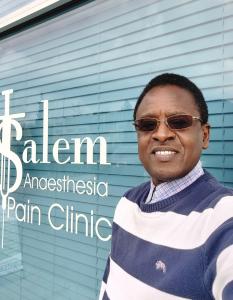Pain Clinics Promote Societal and Public Safety According To New Research; Olumuyiwa Bamgbade, Salem Pain Clinic, Canada
Pain Clinics Heal Individuals Thereby Protecting Communities And Societies; Olumuyiwa Bamgbade, Salem Pain Clinic, BC, Canada
When pain is treated responsibly, everyone benefits; at home, at work, and on the road”
SURREY, BC, CANADA, August 24, 2025 /EINPresswire.com/ -- In today’s interconnected world, individual health profoundly shapes the well-being of society. This is very evident in the role of pain clinics, which have evolved far beyond their traditional mandate of managing chronic pain. A recent peer-reviewed research publication in the SVOA Medical Research journal highlights how pain clinics are becoming powerful contributors to societal safety by addressing risks that extend beyond the clinical setting. Pain clinics promote safer roads, stronger families, and healthier workplaces.— Dr. Olumuyiwa Bamgbade
The clinical study was led by Dr. Olumuyiwa Bamgbade and the Salem Anaesthesia Pain Clinic. Its analysis of data from 1,203 patients over 7.5 years revealed that pain clinics serve as frontline partners in safeguarding public health. Among those receiving care, a significant portion were treated under therapeutic programs aimed not just at symptom relief but at reducing societal risks. These included targeted interventions for driving fitness assessments, child custody, family safety concerns, and workplace readiness evaluations. By helping patients regain full functional capacity, responsibly manage medications, and recover from substance misuse, pain clinics are directly linked to improving safety outcomes across multiple domains.
One striking finding of the study involved patients referred for road safety and driving clearance. Chronic pain, sedation from medications, and impaired cognitive function can all compromise a driver’s ability to operate a vehicle safely. Pain clinics provide structured assessments and rehabilitation, ensuring that patients achieve sufficient mental and physical stability before returning to the road. In doing so, they reduce risks not only for individual drivers but for everyone sharing public roadways.
Similarly, the clinics’ work on family well-being demonstrates their wider societal impact. Families coping with untreated pain, medication misuse, or behavioral health issues face heightened risks of instability, conflict, and even harm. Through multidisciplinary care that integrates medical treatment, psychological support, and social services, pain clinics empower patients to create safer home environments and strengthen family relationships. This benefits the individual and reduces the strain on child protection services, courts, and community welfare systems.
In the realm of workplace safety, pain clinics support both employees and employers by facilitating safe return-to-work programs, managing opioid use responsibly, and conducting functional capacity evaluations. By ensuring that employees are physically and mentally fit to perform their duties, clinics help minimize workplace injuries, enhance productivity, and reduce liability risks for organizations. This, in turn, contributes to broader economic stability and societal resilience.
The common thread running through these contributions is risk mitigation. Pain clinics reduce the likelihood of harm, whether on the road, at home, or in the workplace, by proactively addressing the underlying health conditions that create safety risks. Their work aligns closely with principles of enterprise-wide risk management, offering a preventative strategy that benefits individuals, families, communities, and systems alike.
In a time when public safety challenges are increasingly complex, pain clinics represent a powerful yet underrecognized ally. By integrating medical care with behavioral health, social support, and functional rehabilitation, they extend their impact far beyond individual patients. Their contributions ripple outward, keeping drivers safer, families stronger, workplaces healthier, and communities more secure.
Indeed, pain clinics are not just centers of treatment; they are pillars of societal safety. Their integrated approach to chronic pain and substance misuse transforms lives while strengthening the systems that keep our communities safe. As policymakers, healthcare leaders, and employers seek sustainable solutions to complex safety challenges, investing in and collaborating with pain clinics offers a pathway to a healthier, safer society for all.
Dr. Bamgbade is a healthcare leader with an interest in value-based healthcare delivery. He is a specialist physician trained in Nigeria, Britain, the USA, and South Korea. He is an adjunct professor at institutions in Africa, Europe, and North America. He has collaborated with researchers in Nigeria, Australia, Iran, Mozambique, Rwanda, the USA, Kenya, Armenia, South Africa, Britain, Tanzania, Namibia, Zambia, Botswana, China, Ethiopia, Jamaica, Cuba, and Canada. He has published 45 scientific papers in PubMed-indexed journals. He is the director of Salem Pain Clinic, a specialist and research clinic in Surrey, BC, Canada. Dr. Bamgbade and Salem Pain Clinic focus on researching and managing pain, health equity, injury rehabilitation, neuropathy, insomnia, societal safety, substance misuse, medical sociology, public health, medicolegal science, and perioperative care.
Reference
Bamgbade OA, Savage KJ, Bamgbade TO, Tase NE, Bada BE, Yimam GT, Mwizero AG, Oyewole TE, Chansa M, Gitonga GG, Oluwole OJ, Thibela T, Martinez YL, Chauke GD. Pain Clinic and Societal Safety: Promoting Road Safety, Family Well-being, Workplace Safety, and Risk Management. SVOA Medical Research 2025, 3:4, 159-166.
Olumuyiwa Bamgbade
Salem Anaesthesia Pain Clinic
+1 778-628-6600
salem.painclinic@gmail.com
Visit us on social media:
LinkedIn
Other
Legal Disclaimer:
EIN Presswire provides this news content "as is" without warranty of any kind. We do not accept any responsibility or liability for the accuracy, content, images, videos, licenses, completeness, legality, or reliability of the information contained in this article. If you have any complaints or copyright issues related to this article, kindly contact the author above.

